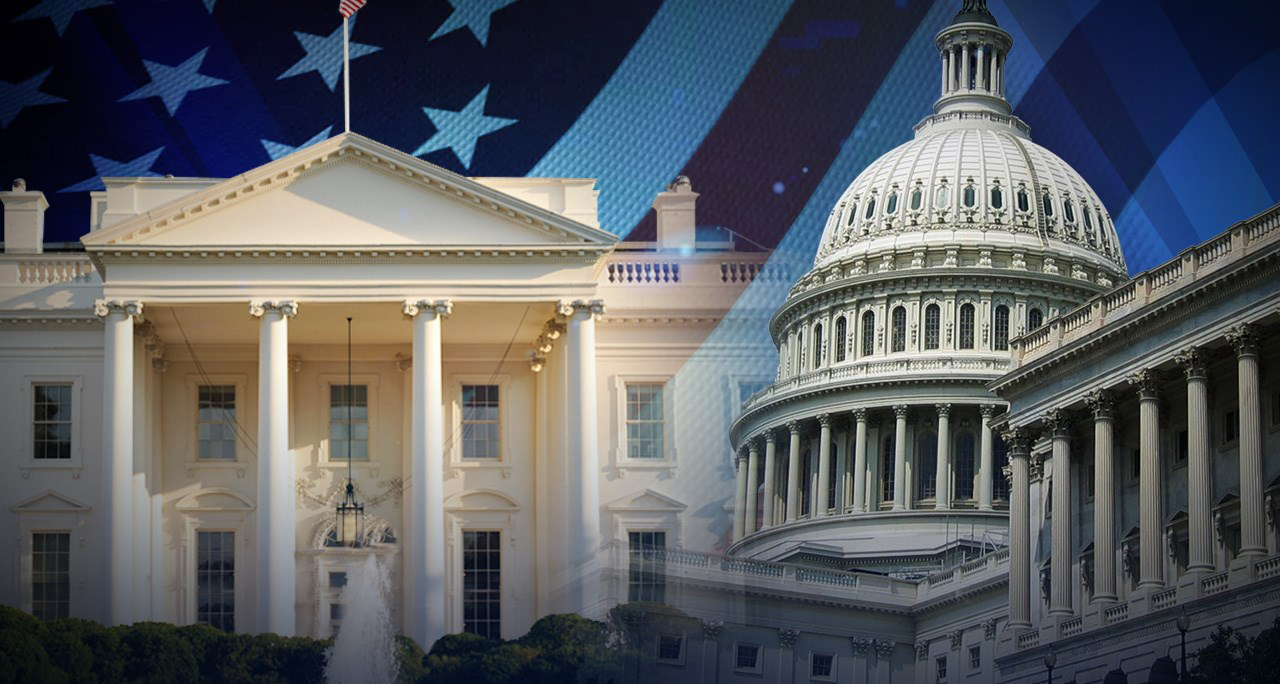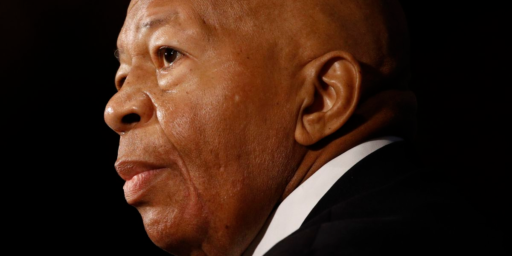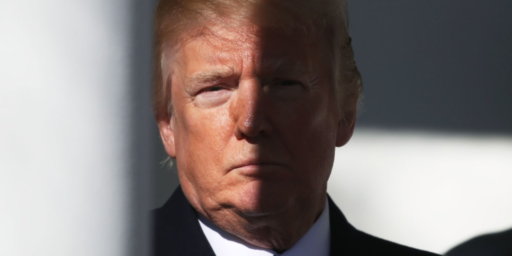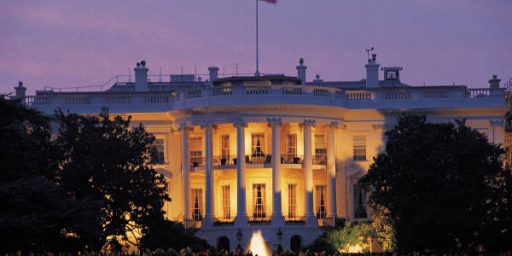Trump Administration Stonewalls Another Congressional Committee
The President is once again claiming Executive Privilege to prevent Congress from getting access to certain documents.

Continuing a strategy that it has been adhering to for the past several months, the Trump Administration is once again seeking to block a Congressional Committee from obtaining documents relevant to an ongoing investigation. Specifically, the Administration is asserting Executive Privilege to prevent the House Oversight Committee from obtaining the documents needed in connection with its investigation regarding the placement of a citizenship question on the 2020 Census:
WASHINGTON — President Trump invoked executive privilege to block access by Congress to documents about how a citizenship question was added to the 2020 census ahead of a House committee vote to recommend that two cabinet secretaries be held in contempt of Congress over the matter.
In a letter to the chairman of the House Oversight and Reform Committee, Representative Elijah E. Cummings of Maryland, the Justice Department said that Mr. Trump had decided to invoke his secrecy powers to provide a lawful basis to defy the panel’s subpoena for the census-related materials.
In response, Mr. Cummings put off until later on Wednesday a vote whether to recommend that the House hold Attorney General William P. Barr and Commerce Secretary Wilbur L. Ross Jr. in contempt. Mr. Cummings called the move “another example of the administration’s blanket defiance of Congress’ constitutionally mandated responsibilities,” adding that it raised a question: “What is being hidden?”
In its letter, the Justice Department maintained that it already had turned over many materials in response to the subpoena, but that it had to keep certain information confidential to protect the candor of internal and attorney-client deliberations.
It also attached a memo to Mr. Trump from Mr. Barr arguing that the executive branch had a “strong interest” in keeping the materials secret to protect its ability to perform its functions, while Congress had not established that obtaining the information was critical to its “legitimate legislative functions.”
“I have concluded that you may properly assert executive privilege,” Mr. Barr wrote to Mr. Trump.
The standoff was the latest move in an escalating confrontation between House Democrats and Mr. Trump, who has vowed to fight “all” their oversight investigation subpoenas. It increased the prospects that the fight will end up in a lengthy court battle fought over the ill-defined line between constitutional powers for Congress to perform oversight and the powers of the president to keep information secret.
There are few precedents in that area of the law to provide definitive guideposts about where to draw that line because past disputes have largely been resolved through negotiations and accommodations, so the matter never reached the Supreme Court.
But Mr. Trump’s unabashed vow to fight House Democrats’ efforts to scrutinize his actions and those of his administration across a range of fronts — including seeking disclosure of his hidden tax returns, how some of Mr. Trump’s associates obtained security clearances, and underlying evidence from Robert S. Mueller III’s inquiry — have raised the prospect of litigation that is appealed all the way to the highest court, providing a clearer understanding of the law but running out the clock on Mr. Trump’s term.
More from The Washington Post:
President Trump asserted executive privilege Wednesday to shield documents about the administration’s decision to add a citizenship question to the 2020 Census, a move meant to try to undercut an expected vote by a House panel to hold his attorney general and commerce secretary in contempt for failing to turn over the materials to lawmakers.
A day earlier, the Justice Department had warned the House Oversight Committee that if it moved toward holding Attorney General William P. Barr in contempt, he would ask Trump to assert privilege to protect the materials. The committee, though, rejected his offer, and was preparing to vote Wednesday on a contempt finding when Trump followed through on Barr’s threat.
The department revealed the assertion in a letter to the committee, which called the contempt vote “unnecessary and premature.”
In the Justice Department’s view, the privilege assertion undercuts the contempt finding because it prevents the attorney general from turning over materials lawmakers had subpoenaed.With the new development, House Oversight Committee Chairman Elijah E. Cummings (D-Md.) announced that he would delay the contempt vote scheduled for Wednesday morning until later in the day so that members could read the Justice Department letter.
“We must protect the integrity of the census and stand up for Congress’ authority under the Constitution to conduct meaningful oversight,” Cummings said in explaining the need for a contempt vote.
He also questioned why Trump had waited to assert executive privilege on the brink of a contempt vote, given that the subpoenas in question were issued two months ago.
“This begs the question,” Cummings said. “What is being hidden?”
Wednesday’s developments marked a further escalation in the fight between House Democrats and the Republican administration over the investigatory powers of Congress that is playing out in multiple committees and the courts.
If the Oversight Committee contempt resolution is approved by the full House, Cummings would be empowered to ask a federal court to order Barr and Ross to comply with subpoenas that sought documents related to the 2020 Census decision and testimony from a senior Justice Department official.
It’s also possible that Democratic lawmakers and the Justice Department could still work out a deal before any court ruling.
The Justice Department and the Oversight Committee are essentially on the same trajectory as the Department and the House Judiciary Committee were last month, when the Judiciary Committee voted to hold Barr in contempt for failing to turn over materials related to former special counsel Robert S. Mueller III’s probe.
In that case, though, the Judiciary Committee and the Justice Department later worked out a compromise. That contempt process is in “abeyance,” though Democrats have taken steps to make sure they have the ability to sue the department in court.
Democrats say the larger issue is that the White House is almost completely rejecting congressional oversight — stonewalling requests for documents and blocking witnesses from testifying on various subjects.
The administration, meanwhile, argues that Democrats are requesting far more materials than they should legally have access to in an attempt to embarrass the president, and they have been unwilling to negotiate
As I’ve noted before, Executive Privilege is among the more powerful tools that the Executive Branch has at its disposal to block Congress from obtaining certain documents of asking witnesses certain questions. It’s not set forth in any provision of the Constitution, of course, and has never been defined in a statute, but the idea that the President enjoys at least some privilege similar to the more familiar Attorney/Client or Spousal Privilege has become an accepted part of American law. At the same time, though, it’s clear that this privilege is not absolute and that, generally speaking, it cannot be used to block Congress, a properly named investigator such as Robert Mueller, or the courts from any examination of the internal workings of the White House under a given President.
The most well-known case dealing with Executive Privilege case is, of course, United States v. Nixon, which involved President Nixon’s attempt to withhold the recordings made in the Oval Office from the Watergate Special Prosecutor. In that case, the Court rejected President Nixon’s assertion of a full and unqualified privilege, thus ordering him to turn over the tapes which led Nixon to resign 15 days after the decision was handed down and evidence of Nixon’s involvement in covering up the Watergate break-in was made apparent. In its unanimous 8-0 ruling the Supreme Court did not fully reject the idea of Executive Privilege but it also stated that there were limits on what could and could not be covered by that privilege. Unfortunately, the nature of the Court’s ruling was such that there is no hard-and-fast rule regarding the privilege, meaning that disputes about its scope must still be considered by the Federal Courts on a case-by-case basis.
Essentially, what the Nixon case, along with legal developments beforehand, tells us is that there are two kinds of Executive Privilege. What the scope of the privilege thus depends on what documents or testimony are being demanded and what form the privilege is being asserted.
The first and most extensive form of the privilege is referred to as the “Presidential Communications Privilege” and covers communications between the President and his advisers. The Vice-President also has this privilege which he can assert on his own if necessary. This privilege is recognized as being rooted in the Constitution, the Separation Of Powers, and the idea that a President must be able to receive candid advice from his advisers. In order for this privilege to be invoked, though, it must involve direct communications between the President and his advisers.
The second kind of Executive Privilege is referred to as the “Deliberative Process Privilege” and it covers certain kinds of internal communications inside the agencies of the Executive Branch. This privilege is much weaker than the Communications Privilege in that it is rooted in Common Law rather than the Constitution. The exact extent of this privilege hasn’t been heavily litigated so it’s rather unclear what is and isn’t covered, and when the interests of Congress in performing its Constitutional role of overseeing the operations of Executive Branch agencies would override it. At the very least, though, it is accurate to state that the Deliberative Process Privilege is much weaker and far smaller in scope than the Presidential Communications Privilege.
Based on all of the available information, it seems fairly apparent that the White House’s invocation of privilege in this particular case is meant to invoke the Deliberative Process Privilege, largely because it doesn’t appear that this assertion of the privilege is related to any communications in which the President or the Vice-President were involved. Therefore, to the extent that the White House is claiming privilege in this matter, the claim is going to be weak and may only be limited to specific categories of documents. Moreover, since the Deliberative Process Privilege is not absolute, it is possible that any claim of privilege will be overridden by the public interest in investigation and oversight by Congress.
With that in mind, what exactly can we say about the Administration’s invocation of privilege in this case?
The answer to that question is likely going to require extensive litigation in the Federal Courts, and the outcome is by no means clear. The communications between Assistant Attorney General Stephen Boyd, Attorney General Barr, and the House Oversight Committee Chairman Elijah Cummings make reference to a number of Justice Department policies regarding the release of information regarding both ongoing and concluded criminal investigations. In support of that assertion, Boyd cites memoranda on the issue that days back to the Administration of Franklin Roosevelt and includes materials as recent as those connected to the Fast and Furious investigation conducted by Congress during the Obama Administration. It was during the course of this investigation, of course, that the Republican-controlled House Oversight Committee chose to hold Attorney General Eric Holder in contempt for his refusal to turn over documents that the Obama Administration ultimately claimed were covered by Executive Privilege. For various reasons, most of these disputes between the White House and Congress were never fully litigated so we don’t really have a record of how courts might interpret the Nixon precedent in light of claims of Executive Privilege such as this.
In any event, though, it is clear that while some of the documents that the committee have requested might be covered by the privilege, this most certainly cannot apply to all of them. In order to resolve the question, though, there will either have to be litigation in the Federal Courts in the District of Columbia or some agreement reached between the Administration and Congress regarding the scope of the privilege and what documents will be made available.
From the outside, though, this seems to be just another example of the Trump Administration’s ongoing strategy of stonewalling every document and witness request from a Congressional Committee regardless of the subject matter of the request or the basis for the Congressional investigation, As I’ve said before one has to wonder how much longer this can continue before House Democrats decide that they’ve had enough and that only the power that comes with an impeachment inquiry will be sufficient to get them the information they’re entitled to.
Here’s the correspondence between the Justice Department, the Commerce Department, and Chairman Cummings:
Correspondence Between Whit… by on Scribd
Letter to Chairman Cummings by on Scribd






Even if it was clear as day, this administration would still refuse to hand over documents, and would force the Democrats to go to court, just to burn up time.
I have to believe that as soon as the Supremes get this question the Administration’s case will essentially vaporize. And thank you for the background material on the two varieties of Privilege, by the way. One of the reasons I keep your click-count up.
Since Watergate, I’ve been sure that the Supreme’s had settled it. And I wonder what the f@ck the Trump lawyers are expecting other than to run the clock as far as possible.
But won’t it be something if the SC ruling that the papers had to be turned over came just about the same time the Trump team got re-elected? Wonder how that would turn out with an energized and vindicated President Trump? Hmmm…
Those who wondered what damage Trump could do to the republic, you’re watching it right now.
The Dennison lesson is you can get away with almost everything, so long as you act as though you have no shame, and don’t mind pissing off millions of people in the other side and a few on your side. If you don’t think future Republican or Democratic presidents will follow this lesson, I invite you to think twice.
It’s weird how much effort the administration is putting into hiding the details about this totally innocuous census question.
What.
Are.
They.
Hiding?
And in other news, Hope Hicks has agreed to testify. That will set Tiny off, but it is a reasonable assumption that Hicks’ attorney told her that there is no way for her not to testify and that she’ll save a pile of money in attorney’s fees if she simply shows up.
Since everyone knows why they want to have the citizenship question on the Census survey, it is rather intriguing to know what they are trying to hide…
@An Interested Party: While we all know, we can’t prove what we know. The proof is what they are trying to hide, of course.
It’s simply easier to just assume bad motives whenever one is dealing with the government. That’s how bad things are becoming.